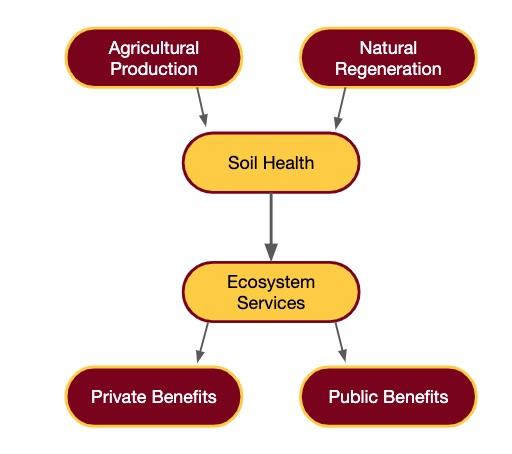Soil health economics encompasses on-farm accounting as well as the public impacts of soil health practices. Soil health accounting requires understanding natural resource management, investment, risk, and information analyses.
From a natural resource perspective, both public and private benefits result from ecosystem services. In turn, ecosystem services result from soil health. Soil health is determined by both natural regeneration and agricultural production practices.
Examples of ecosystem services: water flow regulation, nutrient and carbon cycling, pollutant filtering and detoxification, plant growth, microbial dynamics.
Examples of private benefits: crop and livestock yield, farm profitability, reduced flooding/ponding, longer fieldwork window, drought resilience, less yield variability.
Examples of public benefits: water quality, biodiversity and habitat, pollinators, carbon storage, reduced flooding, sustainability of agro-ecosystems, human health.
The relationships between all of these components is highly uncertain because of variability in climates, crops, and fields, and because costs and benefits develop over multiple years.
The Minnesota Office for Soil Health is part of the community of educators and researchers helping to reduce this uncertainty, through research carried out on farms, in laboratories, and via computer modeling, and emphasizing the complexity of these relationships through stakeholder information exchanges.
In April of 2020, the Minnesota Office of Soil Health hosted its first Soil Health Economics Forum with over 80 attendees, made up mainly of government agencies employees, educators, researchers, farmers, and agricultural industry representatives.
Participants indicated that providing farmers with financial incentives and technical support, as well as research into the links between soil and productivity were important to increase adoption of soil health practices. Research into the ecosystem services provided by soil health practices was not viewed as important. However, we know from a natural resource economics perspective, that the true benefit of soil health practices can be found in the public sector, as well as in the private--and that means the value from ecosystem services.
Soil Health Economics Resources
University of Minnesota resources
- Crop Economics
William Lazarus, Department of Applied Economics. 2020.
Resources for cover crop economics, including a spreadsheet decision tool to estimate cover crops costs and return. - Economics of Tillage
Jodi DeJong-Hughes, University of Minnesota Extension. 2018.
Cost and return of various tillage practices. - Soil Health Case Studies, 2018 and Soil Health Case Studies, 2020 and Soil Health Case Studies, Vol. III 2020 and Soil Health Case Studies, Vol. IV 2021
Research resulting from a partnership between Southwest Regional Sustainable Development Partnership, University of Minnesota Center for Urban and Regional Affairs (CURA) Community Assistantship Program (CAP), Sustainable Farming Association, and University of Minnesota Center for Integrated Natural Resources and Agricultural Management (CINRAM). - Innovations grant funds win-win approaches to food, water
2017 press release for an on-going NSF grant exploring the environmental and economic impacts of soil health practices.
Farm management budget calculators
- Cover Crop Economics Tool USDA-NRCS (from Iowa NRCS, updated 2018)
- Cover Crop Economic Decision Tool University of Minnesota (updated 2022)
- Net Returns Calculator for Cover Crops spreadsheet Iowa State University
- Economics of Cover Crops worksheets Iowa State University (updated 2018)
- Crop Budget Analyzer University of Wisconsin
- Iowa six-year cover crop and no-till transition budget EDF and PFI
- AFT Soil Health Economic Calculator American Farmland Trust (2023)
Soil health farm case studies
- Soil Health Case Studies, 2018 and Soil Health Case Studies, 2020 and Soil Health Case Studies, Vol. III 2020 and Soil Health Case Studies, Vol. IV 2021
University of Minnesota and the Sustainable Farming Association. - Economics of Soil Health Systems
The Soil Health Institute summarized results from 100 farmer interviews, including 10 Minnesota farmers. - Quantifying Economic and Environmental Benefits of Soil Health
American Farmland Trust. USDA CIG grant funded project. 2020.
Estimates benefits from a selection of soil health practices for several case studies in different states. - Soil Health Research
National Association of Conservation Districts (NACD).
Information, including a webinar, on several case studies.
United States Department of Agriculture resources
- Sustainable Agriculture Research and Education
ⓘ Includes information on cover crop economics, including an analysis providing information on returns from cover crops, a calculator for nutrient value, and a case study looking at yield impacts on corn and soybeans. - Saving Money, Time, and Soil: The Economics of No-Till Farming
Elizabeth Creech, Natural Resources Conservation Service. 2017.
ⓘ Cost and return of various tillage practices. - An Economic Perspective on Soil Health
Maria Bowman, Steven Wallander, Lori Lynch. 2016. Amber Waves. Economic Research Service.
ⓘ Provides an overview of soil health economics and provides information on Federal and State incentives for soil health practices.
Resources from other universities
Iowa State University
- The Economics of Soil Health
Mahdi Al-Kaisi. 2017. Iowa State Extension and Outreach.
Provides an overview of soil health economics and includes a research project on farm-level economic return of conservation tillage practices. - Center for Agricultural and Rural Development
Iowa State University.
Cover crop economic resources including decision tools and Iowa cover crop research.
Other universities
- Understanding Budget Implications of Cover Crops
Krista Swanson, Gary Schnitkey, Jonathan Coppess, and Shalamar Armstrong. University of Illinois Urbana-Champaign. 2018
Information on cost and return of cover crops. - Index of Coastal Conservation Practice Studies
University of California, Davis.
Cost and return studies. - Utilizing Cover Crops for Grazing: An Assessment on Economic Benefits
Tong Wang. South Dakota State University. 2020.
Cost and return information. - Cover Crop Economics: Opportunities to Improve Your Bottom Line in Row Crops
Rob Myers, Alan Weber, Sami Tellatin. Sustainable Agriculture Research and Education. 2019
How to get a faster return from cover crops.
